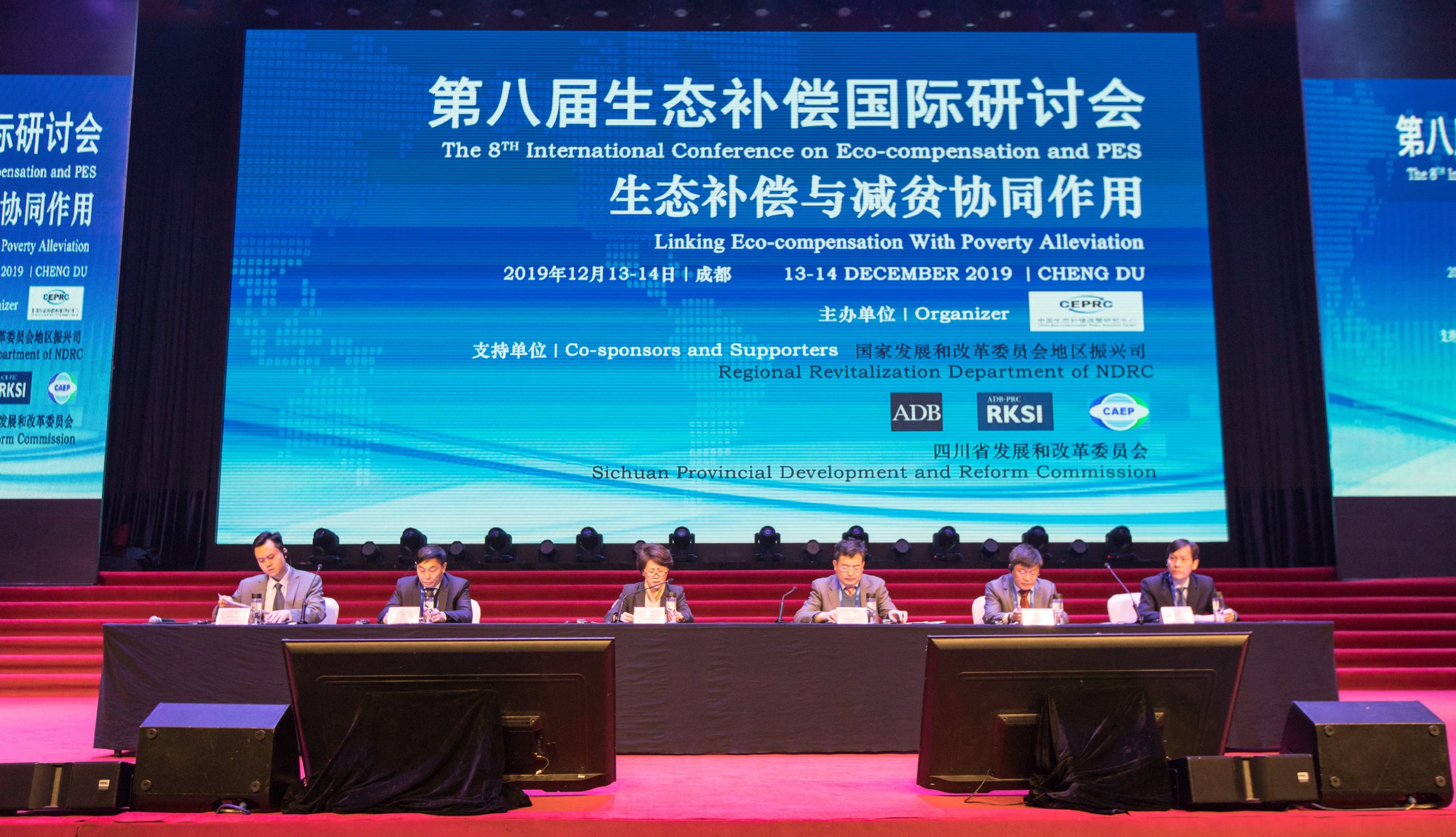Conference & Forum
The 8th International Conference on Eco-Compensation and PES How Eco-Compensation Better Work With Poverty Alleviation
13 Dec 2019 - 14 Dec 2019 The People's Republic of China
Incentive-based natural resource and environmental management is increasingly gaining attention from governments and civil societies around the world. The PRC is developing “eco-compensation” as a mechanism to incentivize the protection of public commons such as catchments and watersheds, conservation of forests, and restoration of degraded grasslands. As policy incentives such as eco-compensation are emerging rapidly in various sectors and regions in the PRC, and payments for ecosystem services (PES) also gaining momentum in ADB’s developing member countries, policymakers, researchers, and practitioners of eco-compensation and PES are eager to learn from experiences in the PRC and other developing countries. This year’s conference is the 8th of a series of annual international conferences focused on eco-compensation and PES, providing a platform for participants to share experiences and lessons on the latest initiatives, ideas, and policies regarding watershed eco-compensation, eco-compensation and poverty alleviation, and private sector engagement.
The conference is co-sponsored by the ADB and the Regional Revitalization Department of the National Development and Reform Commission of the PRC, and supported by the Chinese Academy of Environment Planning of the Ministry of Ecology and Environment, ADB-PRC Regional Knowledge Sharing Initiative, Sichuan Provincial Development and Reform Commission, and Chengdu Municipal Government, and organized by the China Eco-compensation Policy Research Center.
Agenda
| Time | Program |
|---|---|
| 08:00 – 08:30 | Registration |
| 09:00 – 10:20 | Opening Plenary Chair: Wang Xintong, Deputy Director General, Regional Revitalization Department, NDRC |
| 09:00 – 09:50 | Welcome Remarks and Keynote Speeches
|
| 09:50 – 10:20 | Keynote Presentations: Mainstreaming Eco-Compensation into Development: ADB Vision Qingfeng Zhang, Director, EARD, ADB |
| 10:20 – 10:30 | Coffee / Tea Break |
| 10:30 – 12:00 | Session 1: Advancement in Eco-Compensation and Payments for Ecosystem Services Chair: Au Shion Yee, Senior Water Resources Specialist, ADB |
| 10:30 – 10:50 | Eco-Compensation at the Crossroads Jin Leshan, Executive Director, China Eco-compensation Policy Research Center |
| 10:50 – 11:10 | From Payments for Environmental Services (PES) to Conservation Financing: Progress and Challenges Michael Bennett, Senior Environmental Economist |
| 11:10 – 12:00 | Panel Discussion and Q&A Panelists:
|
| 12:00 – 13:30 | Lunch Break |
| 13:30 – 15:25 | Session 2: Watershed Management and Eco-Compensation Chair: Mingyuan Fan, Principal Water Resources Specialist, ADB |
| 13:30 – 13:45 | Eco-Compensation in the Yangtze River Basin: Opportunities and Challenges Liu Guihuan, Research Professor, Chinese Academy of Environmental Planning |
| 13:45 – 14:00 | Management of Transboundary Rivers: Incentives and Institutions Yannick Pochon, senior expert on River Basin Management and Ecological Restoration, International Office of Water |
| 14:00 – 14:15 | Sichuan Watershed Eco-Compensation Mechanism: from an Infant to a Youngster Li Yuedong, Deputy Director General, Sichuan Department of Ecology and Environment |
| 14:15 – 14:30 | Water Rights Trading in the PRC: Innovation and Lessons Learned Chen Xiangdong, Deputy Manager, China Water Rights Exchange |
| 14:30 – 14:45 | Table Discussion: How Best Can Eco-Compensation and PES Serve to Improve Transboundary Watershed Management and Protection? |
| 14:45 – 15:25 | Panel Discussion and Q & A Panelists:
|
| 15:25 – 15:40 | Coffee / Tea Break |
| 15:40 – 18:00 | Session 3: Eco-Compensation and PES with Poverty Alleviation – How to Make It Possible? Chair: Rabindra Osti, Senior Water Resources Specialist, ADB |
| 15:40 – 15:55 | How to Make Eco-compensation Work in the Poverty Belt around Beijing? Liu Yang, Governor, Shuangluan District, Chengde City, Hebei Province |
| 15:55 – 16:10 | PES Programs Design in a Developing Cambodia: Challenges for Scaling-Up
|
| 16:10 – 16:25 | Eco-compensation Demonstration in Northwest Sichuan Province: An Outlook
|
| 16:25 – 16:40 | Poverty Alleviation with Carbon Trading in the PRC: Experiences and Challenges Meng Bingzhan, Manager, SinoCarbon Innovation & Investment Co. Ltd. |
| 16:40 – 17:10 | Table Discussion: What opportunities and challenges exist in combining poverty alleviation and environmental targets in eco-compensation and PES schemes? |
| 17:10 – 18:00 | Panel Discussion and Q&A: Practical Experiences in Jointly Targeting and Developing Performance Metrics for Poverty Alleviation and Conservation. Panelists:
|
| 18:00 – 20:00 | Dinner |
| Time | Program |
|---|---|
| 08:45 – 10:50 | Session 4: Comprehensive Eco-Compensation and Private Sector Role in PES Chair: Annabelle Giorgetti, Environmental Economist, ADB |
| 08:45 – 09:05 | Incentive Package for Landscape Restoration: FAO Perspective Mathilde Iweins, Asia Pacific Coordinator for the Forest and Landscape Restoration Mechanism, FAO |
| 09:05 – 09:20 | Market Based Eco-compensation Fund in Huangshan: Lessons Learned from ADB Project Mingyuan Fan, Principal Water Resources Specialist, ADB |
| 09:20 – 09:25 | Q&A |
| 09:25 – 09:40 | Exploration of Comprehensive Eco-compensation: A Framework Dong Zhanfeng, Research Professor, Chinese Academy of Environmental Protection |
| 09:40 – 09:55 | Innovative Financing for Watershed Protection: FI Role in Chishui Wang Qi, Professor, Deputy Dean, College of Environmental Sciences and Engineering, Peking University |
| 09:55 – 10:10 | Eco-compensation: Innovation and Initiative in Chengdu TBD, Sichuan Province |
| 10:10 – 10:50 | Panel Discussion: Opportunities and Challenges in Engaging the Private Sector and Civil Society to Catalyze Green Finance
|
| 10:50 – 11:05 | Tea Break |
| 11:05 – 12:00 | Concluding Session Chair: Dongmei Guo, Environment Specialist, ADB |
| 11:05 – 12:00 | Concluding Remarks Wang Xintong, Deputy Director General, Regional Revitalization Department, NDRC Qingfeng Zhang, Director, EARD, ADB |
| 12:00 – 13:30 | Lunch |
| 13:30 – 15:30 | Internal Meeting (by invitation) Participants: KSTA-9653(PRC) ADB team, NDRC, KSTA CAU team, Sichuan DRC, Hubei DRC, Jiangxi DRC. |


